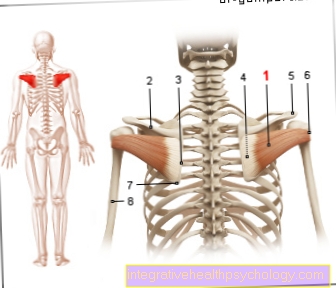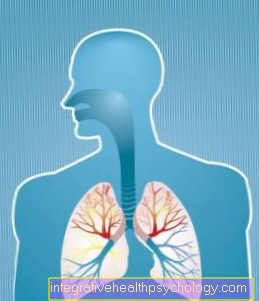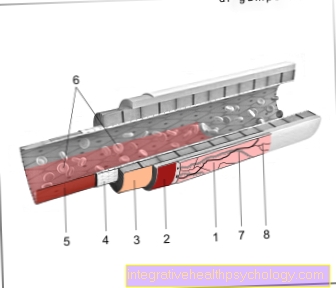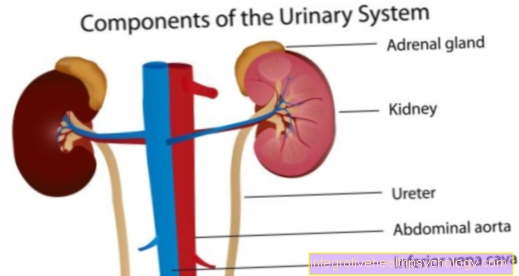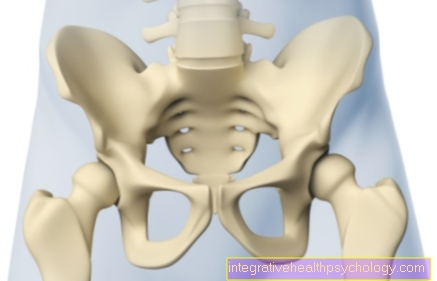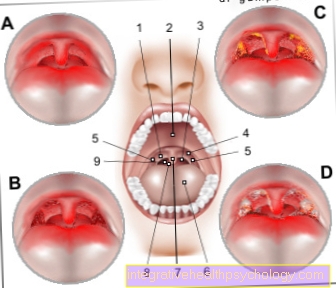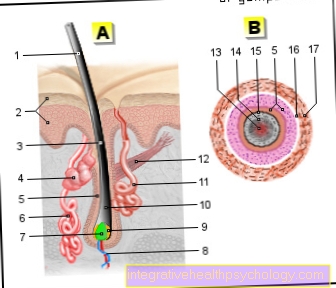Fetal alcohol syndrome
introduction
The fetal alcohol syndrome is one of the so-called embryo fetopathies. In other words, to a group of diseases that are characterized by the fact that the unborn child is damaged or malformed during pregnancy. In Germany it is also the most common reason for an intellectual disability.
Approx. every thousandth child in Germany is born with signs of a fetal alcohol syndrome. A characteristic face shape is typical of the FAS, which will be discussed in more detail in a separate section.

Causes of Fetal Alcohol Syndrome
As the name of the syndrome suggests, FAS is caused by maternal alcohol consumption during pregnancy. As a rough rule of thumb, the earlier in pregnancy the alcohol is consumed, the worse the effects on the unborn child. A value below which alcohol consumption is not dangerous for the child has not yet been established.
In the worst case, alcohol consumption leads to so-called fetal death, i.e. the unborn child dies in the womb.
Read more on the topic: Alcohol During Pregnancy
Diagnosing fetal alcohol syndrome
The diagnosis of fetal alcohol syndrome is based on a few clues and can usually only be made with great certainty in the course of childhood.
A distinction is also made between a fully developed FAS and a first or second degree fetal alcohol syndrome, depending on how severe the syndrome is.
The full picture includes, on the one hand, proven alcohol consumption by the mother during pregnancy as well as reduced growth, damage to the central nervous system - which culminates in mental retardation and the presence of a face shape typical for FAS.
The mental retardation usually only becomes apparent in the course of the first few years of life and should be a warning for every pediatrician.
Also read our topic: Stunted growth
Accompanying symptoms of fetal alcohol syndrome
Children with fetal alcohol syndrome have many other symptoms in addition to mental impairment.
Bone deformities can occur, such as the forearm bones growing together, misalignment of the jaw or a so-called connective tissue weakness. Children suffer from slack joint ligaments and have a changed, often slacker complexion. In addition, their overall growth is restricted. So they suffer from short stature and often have a skull that is too small at birth.
Other affected areas can be almost any internal organ. As a rule, the FAS is associated with a heart defect. In over 90% of the cases, it is a ventricular septal defect, i.e. a pathological connection between the two heart chambers. In addition, the urinary and reproductive systems of these children are often not properly developed. This can affect the external genitals as well as the kidneys and ureters.
In addition to mental retardation, there are frequent seizures, decreased pain perception and general sensitivity problems, which in turn suggest damage to the central nervous system.
Changes in the face caused by the FAS
As mentioned in the sections above, pronounced fetal alcohol syndrome can mainly be seen on the child's face.
The narrow lips of these children are striking. This affects both the upper and lower lip. The chin is set back; the doctor describes this as a receding chin, as the connection from lip to chin runs continuously backwards in the profile view.
Affected children also stand out because the distance between the eyes is perceived as too large. The axis of the eyelids is not straight, but usually so that the outer corner of the eye is lower than the middle corner of the eye. The upper point of attachment of the ears slips below the level of an eyelid axis that is extended to the rear. This fact becomes particularly clear in the profile view. In addition, the ears appear slightly rotated backwards, as if the upper pole of the ears had been pulled backwards.
Another very noticeable feature is the no longer existing "philtrum"; Colloquially also called Rotzrinne. The connection between the nose and the upper lip in the FAS is therefore usually flat, without elevations.
Last but not least, and not entirely part of the face, affected children have a narrow forehead and an overall too small head.
The descriptions given here are full versions and may only be partially or not at all for the persons concerned.
Changes in behavior by the FAS
Children with fetal alcohol syndrome are generally considered to be particularly restless, excited and restless. Most of the time, they find it difficult to remain still or to concentrate on one thing for a long time. In later childhood their peers often describe them as intrusive, not very distant or simply as "weird".
In addition, these children stand out with learning difficulties. It is difficult for them to remember instructions or facts and as a result often appear lazy or disorganized in their environment.
Treatment of fetal alcohol syndrome
A causal treatment of the disease is no longer possible after its manifestation. In order to prevent the occurrence of the syndrome, the mother would have to completely refrain from consuming alcohol during pregnancy.
With the help of modern medicine, only some of the symptoms can be corrected. The common heart defects can be treated with the help of surgical interventions. Hearing weaknesses or eye defects can be remedied with the help of hearing aids, cochlear implants and glasses or contact lenses.
However, the mental retardation of the affected children cannot be treated. These children can only be given the best possible support in their development through the use of speech therapy, physiotherapy and occupational therapy. The development deficits can thus be made up to a small extent.
It is not uncommon for the children to receive psychotherapeutic care in order to be able to better process experiences during their upbringing by an alcoholic parent.
However, you should refrain from careless treatment such as a child with ADHD. Although the FAS is also associated with ADHD in some cases, fetal alcohol syndrome and ADHD are not to be regarded as the same thing.
If you would like information on the subject, we recommend our pages on:
- Attention Deficit Hyperactivity Disorder
- Recognize hearing impairment in children - does my child hear correctly?
Duration and prognosis of the FAS
Fetal alcohol syndrome, as is typical of syndromes, is an incurable condition. As already described, the development delays can only be partially made up.
Epidemiologically it has been shown that people suffering from FAS have a shorter life expectancy. In further life they will often offend with social conventions and find it difficult to build a stable social environment.
Consequences in kindergarten through the FAS
In kindergarten, children suffering from FAS stand out primarily because of their “exhausting nature”. They find it difficult to sit still or to be enthusiastic about something for a long time. They quickly appear distracted and behave more directly than their peers.
Since other children usually find it difficult to cope with this species, children with FAS find it more difficult to make friends. The delay in development is already evident in kindergarten age. In addition to restricted motor and mental abilities, these children cannot stay dry and alone in the toilet when they enter kindergarten.
Follow in school through the FAS
At school, the children affected are mainly concerned with difficulty concentrating. They become increasingly restless over the course of a school morning. The performance demands of a normal school are too high for many of the children, so that attending a school with special support is what they benefit most from.
Dealing with people of the same age who is not ill is particularly difficult at this time, as the development deficit becomes more and more apparent with increasing age. As a result, their interests are significantly different from those of their peers.
Read more on the topic: Poor concentration
Consequences in adulthood through the FAS
In young adulthood, the developmental delay shows itself in its full expression. In terms of mental development, they often lag behind at the level of a youth.
In addition, they have an increased risk of addictions and depression. They often suffer from impaired impulse control and are only considered socially acceptable to a limited extent.
In general, two tendencies of behavior can be distinguished. While one group tends to isolate itself, isolate itself and fearfully when it is overwhelmed or overstimulated, the other group tends to flee and thereby flee from the situation.
In addition, people with FAS are predisposed to trust people who appear nice to them without reservation. Especially in adulthood, this gives rise to the possibility of taking advantage of them or moving them to unwanted actions.

